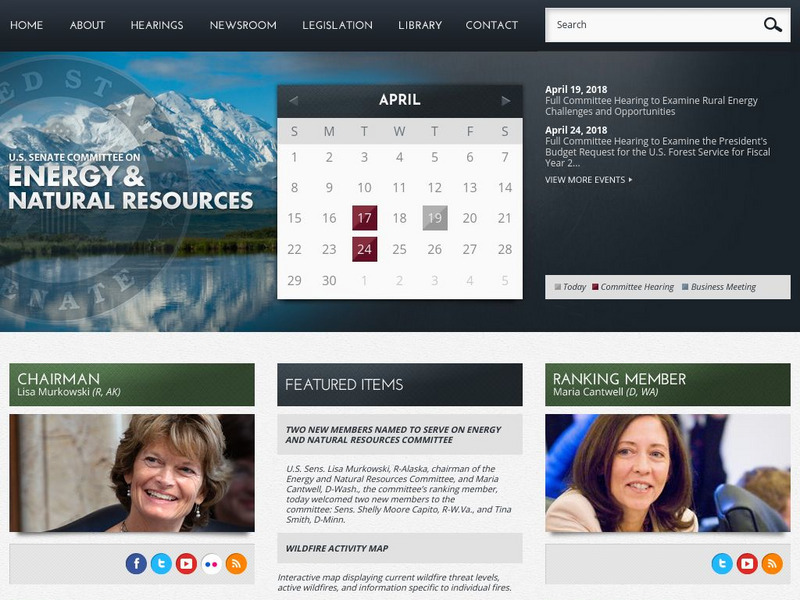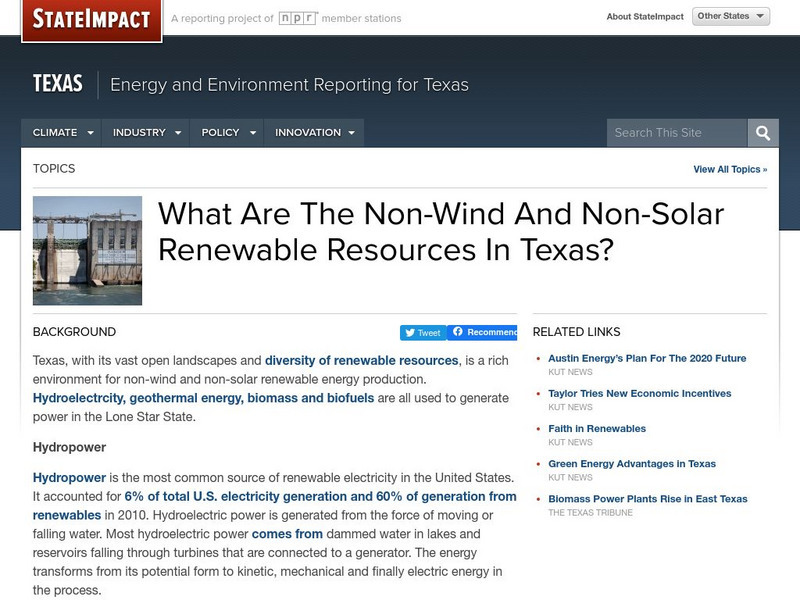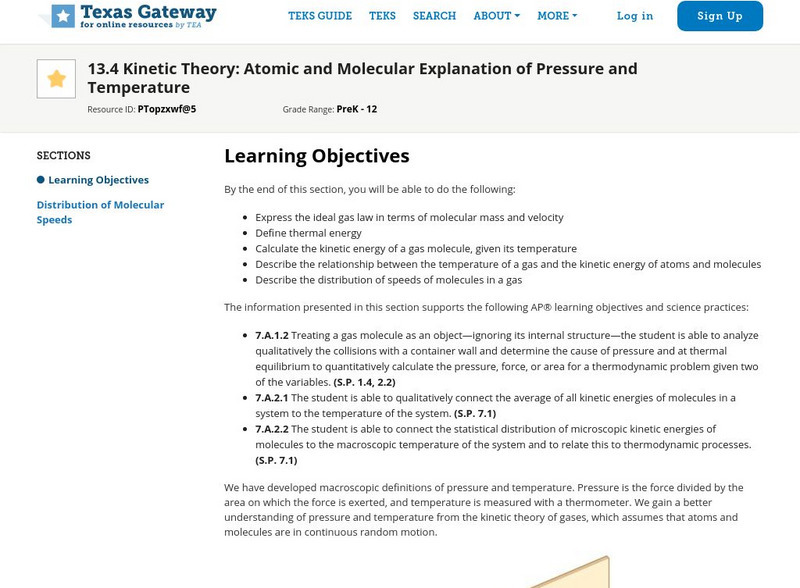American Museum of Natural History
Light, Matter and Energy
Let Einstein's work shine the way. Pupils read about Einstein's iconic equation, E=mc^2, using a remote learning resource and see how ideas from other scientists such as Kepner, Curie, Galilei, and Newton led to its discovery. They...
Weber State University
The Sun and the Seasons
Why is there more daylight in June than in December if you live above the equator? How does the angle of sunlight shift throughout the year? Answer these questions and more with an interactive article about the sun, its path through the...
American Museum of Natural History
What is the Greenhouse Effect?
Without the greenhouse effect, Earth would not be inhabitable. A thorough online resource describes the greenhouse effect and how it occurs. The source highlights the different types of gases that work together to absorb the sun's...
American Museum of Natural History
Climate Change
It actually is possible to have too much of a good thing when it comes to climate change. A slide show lesson describes how burning fossil fuels contributes to climate change. Individuals read about the scientific process and the...
ProCon
Obesity
Is obesity a disease or just a preventable risk factor for other diseases? Scholars attempt to form their own opinions by reading a background of the issue and watching videos that explore the main pro and con arguments using an included...
American Museum of Natural History
What is Biodiversity?
Not all dogs are the same just like not all finches are the same. An interactive online lesson helps individuals learn about the causes and limitations to biodiversity. The clickable sections describe the basics of the genetics of...
American Museum of Natural History
They Glow!
Would you believe marine animals can make their own light? An online resource describes the process of bioluminescence and how animals in the ocean use it to survive. The lesson features a catchy tune that describes the behavior of ocean...
American Museum of Natural History
Talking to Fireflies
Fireflies are more than just mobile twinkle lights. An online interactive lesson teaches individuals about the light patterns fireflies use to communicate with each other. After they practice the patterns themselves, they could be...
US Senate
U.s. Senate Committee on Energy and Natural Resources
The responsibilities of the Committee on Energy and Natural Resources oversees important legislation in Congress and has distinguished itself as among the most nonpartisan in the Senate.
Other
North Carolina Department of Energy and Natural Resources: Stormwater Pollution
Lots of information about stormwater - what it is, how it can become polluted and impact on water resources, how to prevent this, and how to conserve and protect water resources.
Other
Energy Star: Energy Star Kids
The Government sponsored resource helps individuals protect the environment through superior energy efficiency. Topics examined are climate change, global warming, and energy. The resource consists of games and activities, lesson plans,...
Curated OER
National Park Service: Energy and Minerals
A site that reviews over the mining of minerals, oils, and gasses in the National Parks. Understand that programs that are put in place to ensure the mining is done responsibility and does not affect the parks resources.
NPR: National Public Radio
Npr: What Are the Non Wind and Non Solar Renewable Resources in Texas?
An overview of renewable energy resources in Texas, aside from wind and solar energy. Covers hydropower, geothermal energy, and biomass.
US Department of Energy
U.s. Department of Energy: Bionergy Technologies Office
Information and resources on bioenergy, biomass and biofuels.
National Academies of Sciences, Engineering, and Medicine
The National Academies: Our Energy Sources
The many sources of energy production in the United States are described in this overview. Included are traditional sources, renewable sources, and new energy production technologies.
US Department of Energy
U.s. Department of Energy: Science Education
Use this resource to learn about how the Department of Energy provides information on science competitions, energy conservation, case studies and more.
US Department of Energy
U.s. Department of Energy: Energy Savers
Find information on everything from buying energy-efficient products to using the proper landscaping for particular climates to conserve resources. Starting with an energy assessment, this website will help users reduce their consumption...
PBS
Pbs Learning Media: Snapshot of u.s. Energy Use
This video segment adapted from NOVA/FRONTLINE looks at American energy consumption and the resulting production of greenhouse gases. [4:59]
US Energy Information Administration
U.s. Eia Energy Kids: Energy Sources: Renewable
Find out what renewable energy is and the role it plays in meeting energy needs. Renewable energy sources include biomass, hydropower, geothermal, wind, and solar.
US Department of Energy
Doe: Fossil Energy: Education Start Page
Overview of the fossil energy industry (oil, gas, coal) with detailed descriptions of the processes and the work of the people employed in the industry.
US Department of Energy
U.s. Department of Energy: Solar Energy Technologies Program: Solar Multimedia
Browse and download from this multimedia collection which contains photographs, videos, B-roll, graphics, and animations related to solar technologies, research, and projects.
Texas Education Agency
Texas Gateway: Atomic and Molecular Explanation of Pressure and Temperature
Learn how to calculate the kinetic energy of a gas molecule, describe the relationship between the temperature of a gas and the kinetic energy of atoms and molecule, and describe the distribution of speeds of molecules in a gas. The...
Texas Education Agency
Texas Gateway: Atomic and Molecular Explanation of Pressure and Temperature
We gain a better understanding of pressure and temperature from the kinetic theory of gases, which assumes that atoms and molecules are in continuous random motion. Learn more about Kinetic Theory with the following detailed resource...
PBS
Pbs Learning Media: Acids and Bases: Making a Film Canister Rocket
ZOOM cast members mix different amounts of baking soda and vinegar to see which combination produces the most carbon dioxide for launching a film-canister rocket. [3:23]


















